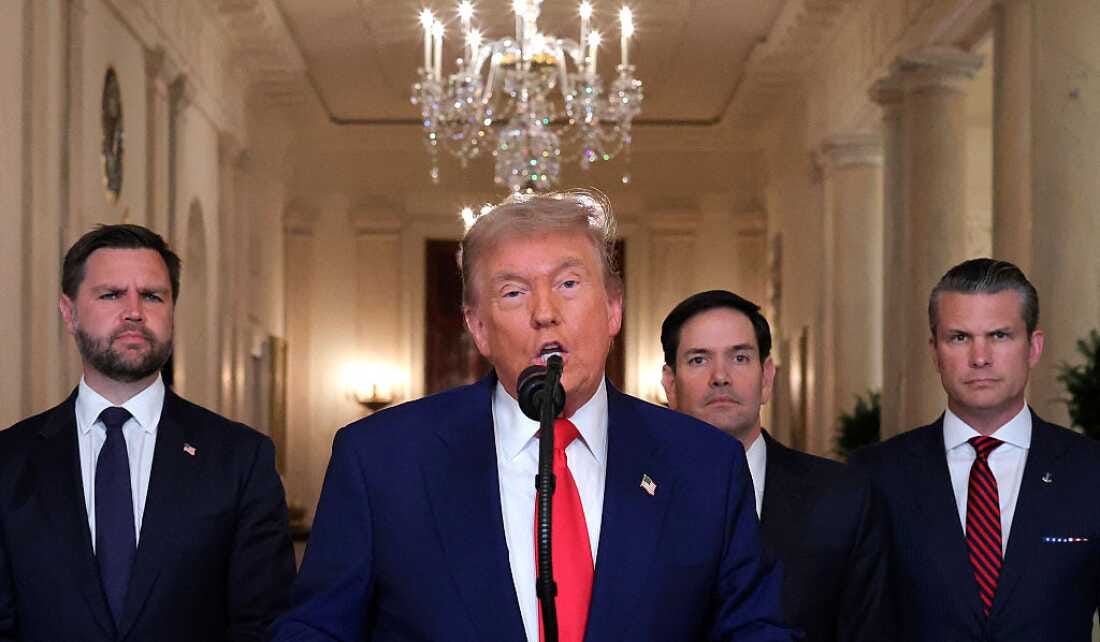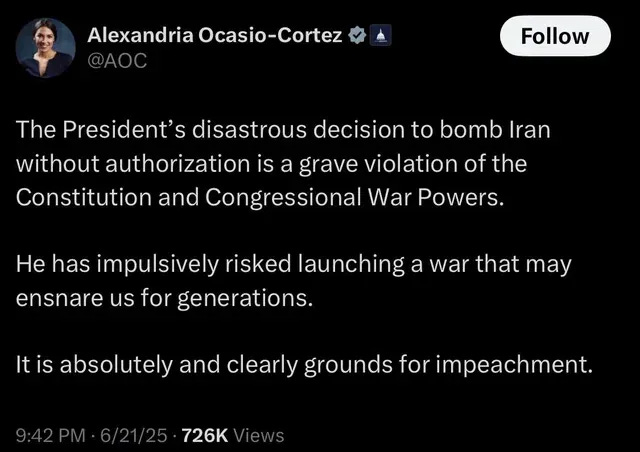It’s been a month since I’ve posted on Substack. I’ve been swamped with work and personal crises since early May, and I don’t expect to have much time for blogging until at least the end of September. Still, I want to give a quick reaction to the U.S. attack on Iran last night. I’ll likely publish something more in-depth in the coming days or weeks. For now, however, I feel a responsibility to make it clear where I stood from the moment my government launched another disastrous state terrorist campaign in my name. I am under no illusions that I will stop the war or have any appreciable impact on the course of world history. Yet, I’ll be damned if I don’t make it clear that I was already against the next war.
The Israeli attack on Iran earlier this month was unprovoked and unjustifiable. The U.S. intelligence community and the International Atomic Energy Agency have confirmed repeatedly that Iran is not working to develop a nuclear weapon. Up until a day before the attack, Iran was in negotiations with the United States. If the Trump regime hadn’t insisted on including poison pills like zero enrichment in any potential nuclear deal, they likely would have reached an agreement.
Even if Iran was systematically working toward developing a nuclear weapon, it wouldn’t have been grounds for attacking Iranian civilian and dual-use nuclear infrastructure, which is probably a violation of Article 56 of Additional Protocol I to the Geneva Conventions. Historically, preventive attacks on nuclear facilities, like Israel’s attack on Saddam Hussein’s Osirak reactor in 1981, have only intensified countries’ nuclear ambitions and driven their programs further underground. Even if you believe the Israeli government — in which case I have some aluminum tubes to sell you — the strike only set back Iran’s program by two to three years, while also likely leading to Iran withdrawing from the Non-Proliferation Treaty.
Yes, Iran is enriching uranium up to 60% — maybe that’s why the United States shouldn’t have blown up the nuclear agreement that was capping Iranian enrichment at 3.67% and then spent the next seven years needlessly provoking Iran at every opportunity.
Iran, like plenty of other states, engages in nuclear hedging behavior. If it’s a good thing that Israel — an extralegal nuclear proliferator — has started a war against a country that doesn’t have a nuclear weapons program but might hypothetically start one in the future, then I fail to see why we shouldn’t be egging on North Korea to bomb the South, whose conservatives have been at least as giddy as Iran’s hardliners about acquiring a nuclear deterrent. Of course, encouraging a new Korean War is obviously insane, so we ought to re-examine the principle.
Israel’s leadership calls its strike preemptive. But anyone who knows anything knows that there was no impending Iranian attack on Israel. At best, Israel’s war is preventive, like America’s invasion of Iraq and Russia’s invasion of Ukraine. It is ostensibly aimed at preventing an undesirable change in the balance of power, not fending off an imminent threat to Israeli sovereignty. At worst, it is a predatory, revisionary, and ill-fated bid for regional hegemony.
The principle of non-aggression is written into the foundation of the post-1945 international order. Article 2(4) of the U.N. Charter prohibits states from threatening or using force against each other except in cases of self-defense or pursuant to the authorization of the Security Council. The charter and judgment of the International Military Tribunal at Nuremberg declares that initiating a war of aggression “is not only an international crime [but] the supreme international crime differing only from other war crimes in that it contains within itself the accumulated evil of the whole.”
It is impossible to know so far how many innocent people will suffer and die because of Israel’s war. It may range from the thousands to the millions. The direct culpability for each individual act of violence of course lies with whoever pulls the trigger. But there is an additional responsibility in any war of choice that is borne exclusively by the aggressor.
Last night, Donald Trump — flanked by his motley cabal of millenarian war freaks — announced that the United States had directly joined the war against Iran on the side of the aggressor.
It’s unclear what happens next. Iran will almost certainly move to acquire nuclear weapons, whether the regime survives or not. (Remember, Iran’s nuclear program was started under the Shah, not the Ayatollahs.) It will also be compelled to retaliate against the United States, if only because America and Israel have now supercharged Iranian nationalism. The 40,000 U.S. troops in the Middle East all now have targets on their backs. If any of them are killed, you can bet the regime change maniacs will be calling for blood. At that point, Trump may either flinch at the prospect of more Americans coming home in body bags, or fully commit to toppling the Iranian government. The latter would require U.S. boots on the ground and invite the Iranians — who would have nothing left to lose — to wreak as much havoc as necessary to protect the regime and make the cost of war intolerable to the United States. If the war doesn’t become America’s Ukraine, it will most likely become one big Syria.
Whatever happens — and however many innocent Israelis, Iranians, and Americans are blown to bits — it will ultimately be the fault of the Israeli terrorist regime and its American enablers who made the deliberate choice to go to war.
Historically, the world’s few true believers in international law and justice have endeavored not to take the crime of aggression lightly. Charges for crimes against the peace lay at the center of the Nuremberg and Tokyo trials after World War II. Twelve of the Nazi defendants at the International Military Tribunal were convicted of aggression ex post facto, and six were hanged. In 2010, with the adoption of the Kampala Amendments, aggression was elevated to a core international crime and afforded to the International Criminal Court’s jurisdiction alongside war crimes, crimes against humanity, and genocide.
There is already a movement in Congress to invoke the War Powers Resolution to end Trump’s unauthorized war of aggression, though it’s unlikely to go anywhere. Last night, Alexandria Ocasio-Cortez floated the prospect of impeachment. Even the hapless Chuck Schumer has managed to mount a scathing procedural critique of Trump’s actions. This is all well and good, and Congress needs to act posthaste.
But this is the bare minimum response that should be expected from our representatives. Trump’s strike is unconstitutional and procedurally inappropriate, yes. It is also unprovoked and blatantly illegal under U.S. and international law, a clear violation of the U.N. Charter, a crime of aggression under the Rome Statute, and a middle finger to the so-called rules-based international order the American foreign policy establishment pretends to love so much.
Trump, Vance, Rubio, Hegseth, and anyone else involved in the attack at the top level needs to be removed from office and put on trial. If they can’t be tried in the United States, then the next administration needs to voluntarily submit the United States to the jurisdiction of the International Criminal Court and have them hauled off to The Hague. Netanyahu is already the subject of an ICC arrest warrant for war crimes and crimes against humanity stemming from the internationally recognized genocide in Gaza. Now, they ought to charge him with aggression as well.
Robert Jackson, the American jurist who served as chief U.S. prosecutor at the Nuremberg tribunal, made clear in his opening statement that the trial of the Nazi war criminals represented a fundamental transformation in the meaning of international law, not just victor’s justice:
Unfortunately, the nature of these crimes is such that both prosecution and judgment must be by victor nations over vanquished foes. The worldwide scope of the aggressions carried out by these men has left but few real neutrals. Either the victors must judge the vanquished or we must leave the defeated to judge themselves. After the first World War, we learned the futility of the latter course. The former high station of these defendants, the notoriety of their acts, and the adaptability of their conduct to provoke retaliation make it hard to distinguish between the demand for a just and measured retribution, and the unthinking cry for vengeance which arises from the anguish of war. It is our task, so far as humanly possible, to draw the line between the two. We must never forget that the record on which we judge these defendants today is the record on which history will judge us tomorrow. To pass these defendants a poisoned chalice is to put it to our own lips as well. We must summon such detachment and intellectual integrity to our task that this Trial will commend itself to posterity as fulfilling humanity’s aspirations to do justice.
Over the past week, Netanyahu has taken to invoking the Nazi Holocaust to defend the undefendable in Iran, meanwhile his best friends and allies in the United States post Nazi dog whistles on Twitter. It’s not hyperbolic to say that the present moment may either reaffirm or fundamentally undercut the lessons and legacy of 1945. We must decide in the coming weeks, months, and years whether international law and the Nuremberg principles mean something or not. If they mean anything, then we need to start locking people up.





The violation of international norms will lead to a collapse of those norms. But how many times before have these norms been violated? The "Nuremberg norms" only lasted about 8 years, from 1945 to 1953. Then, in 1954, the CIA began to fund the French colonial war against Vietnam. I'm sure there were other violations in that 8 year period, but Vietnam was a big one.
Maybe these private violations don't matter; it's public violations that weaken the norms. Well, Vietnam in 1964 was a big violation. Iraq and Afghanistan were violations. It doesn't seem like these Nuremberg norms have ever stopped America from doing anything.
Nuremberg norms against wars of aggressions seem about as effective as Constitutional norms against executive war powers. When those norms promote the American interest (in Ukraine), they are upheld. When they contradict the American interest (Iran), they are ignored.
I think the only honest, practical position is to either argue from the perspective of the American imperial interest or to support some kind of "Axis of Resistance." I prefer the former. But trying to avoid taking a side doesn't seem to be an option.
The recent events shouldn't distract anyone from the urgency of dealing with bug suffering